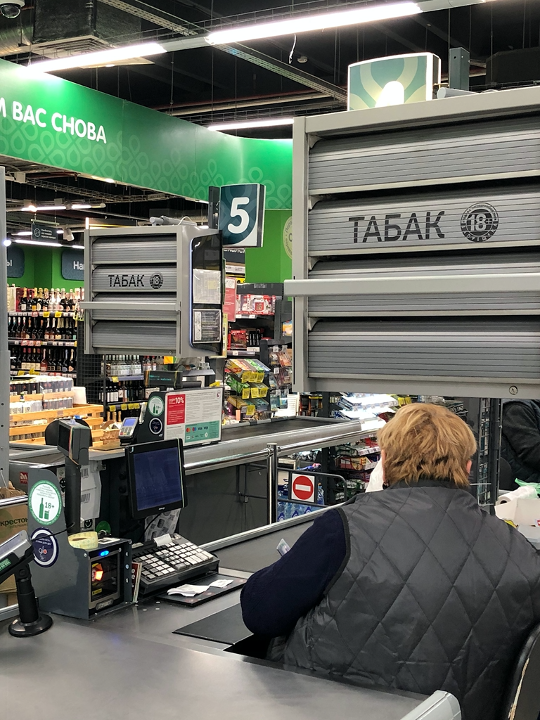Photo: Tobacco displays at a grocery store in Russia are covered and simply labelled “tobacco” (tabak), so shoppers are not exposed to tobacco advertising.
During a recent trip to her home country, Russia, Irina Morozova, Director of the Road Safety Communication program and a longtime tobacco control technical advisor on the Policy, Advocacy and Communication team, reflects on tobacco control work there, charting the progress that has been made to protect citizens with smart policies, including a recent tobacco tax proposal to generate revenue for COVID-19 recovery.
This summer I left New York City, where I have lived for 10 years, and went back to my homeland, Russia, to spend time in the woods outside Moscow.
Walking around the capital (wearing a mask, of course), I was able to take in the rich fragrances of food and other smells of the city, rather than the toxic fumes of cigarettes—a significant improvement from how it was when I left a decade ago.
At that time, Russia was one of five key focus countries in the Bloomberg Initiative to Reduce Tobacco Use, a landmark global initiative founded on the idea that we can save 100 million people from early death due to tobacco use. Russia’s smoking prevalence then was 39.1% among adults—one of the highest smoking rates in the world. As part of a small partnership of civil society and government stakeholders, I developed media campaigns to advocate for strong tobacco control legislation and foster a receptive environment for change. Our group also advised the government on smoke-free policy and effective legislation, especially surrounding packaging and labeling, point of sale displays and tobacco advertising, promotion and sponsorship (TAPS).
We saw our hard work pay off when a national tobacco control law was signed on “Defender of the Fatherland Day,” Feb. 23, 2013. The law restricted smoking in public places and banned TAPS, point of sale marketing and depictions of smoking in movies. That legacy has continued to grow; Last summer, a new amendment to the Tobacco Control Law placed tobacco and other nicotine products, including e-cigarettes and heated tobacco products, under the same legal restrictions.
The country has since made great strides in reducing tobacco use. In March 2015, the Ministry of Health found that the number of smokers in Russia had decreased by approximately 17% since the adoption of tobacco control legislation. Additionally, a new country initiative has the ambitious goal of decreasing the prevalence of smoking among Russian adults to 21% by 2035.
The World Health Organization gives Russia an overall score of 7 out of 10 for smoke-free compliance because the government continues to incrementally increase tobacco taxes, restrict tobacco advertisements and invest in tobacco control media campaigns. The point of sale restrictions on advertising also include covered cigarette displays, so customers are not exposed to tobacco package advertising while shopping.
Recently, the Ministry of Finance announced a plan to increase tobacco taxes by 20%. This tax is intended to generate revenue for the government which has been under economic strain because of the COVID-19 pandemic. The current price of a cigarette pack in Russia is 115 rubles (US $1.48), and of this, more than half, at least 64 rubles are taxes. Under the new plan, a pack of cigarettes will cost 138 rubles or US$1.78.
A few challenges remain: the law is vague concerning smoking in outdoor spaces of restaurants and on balconies—the latter effectively offering smokers the best spaces and views of the city while they eat and drink. Also, while there are strong graphic health warnings on cigarette packs, there are no plans to implement plain packaging. Plain packaging means warning labels cover the whole pack, only certain drab colors may be used and logos or other branding elements are not allowed.
I will be sure to check back on my home country’s progress in the coming years. In the meantime, I’m encouraged by how the work we started over 12 years ago is being enforced and strengthened.
